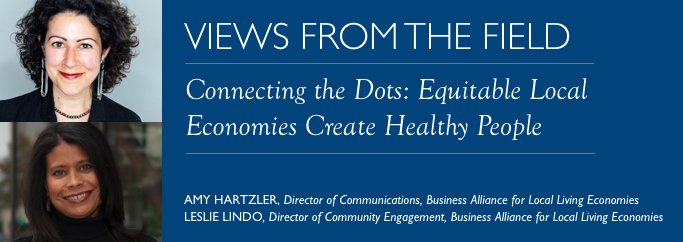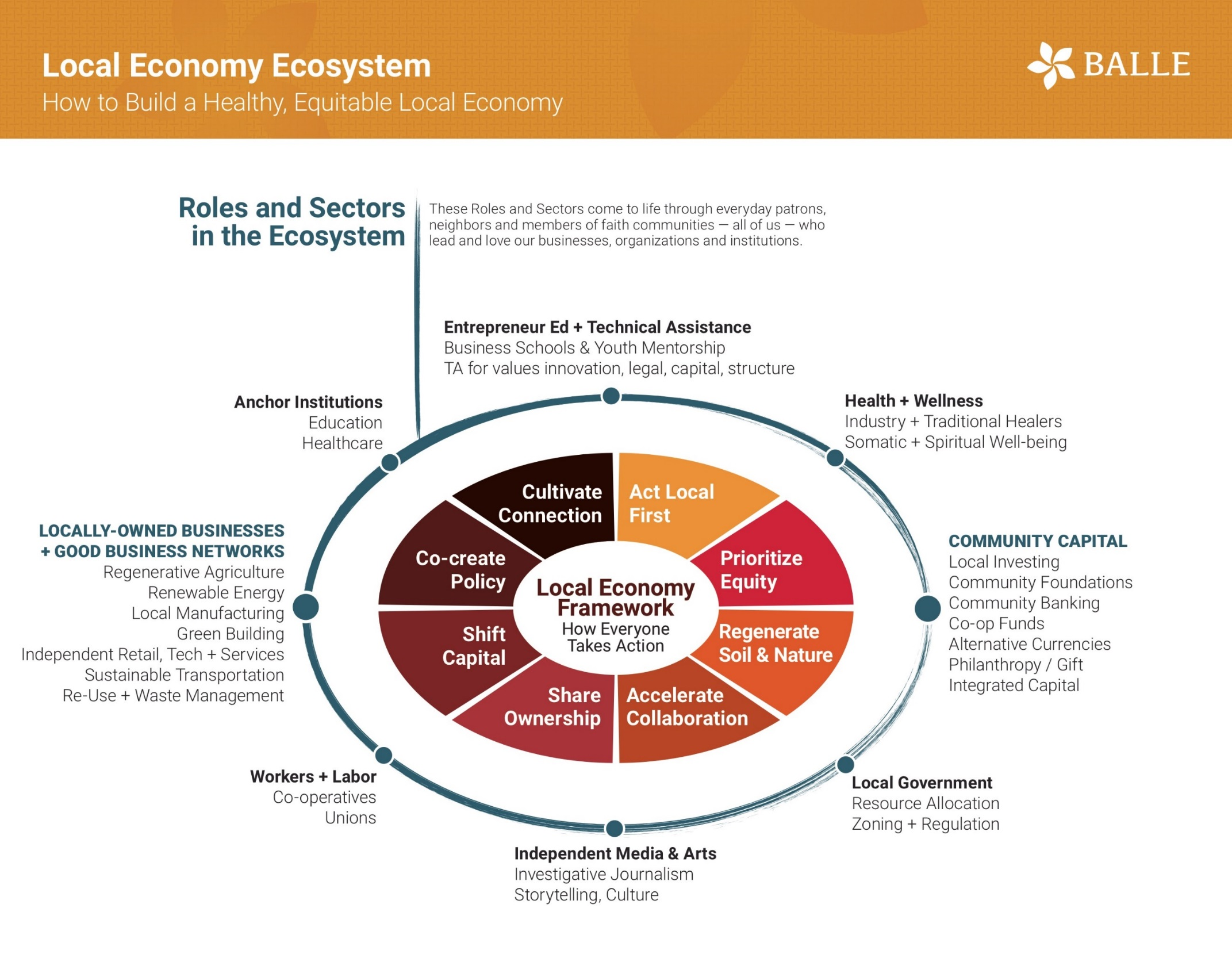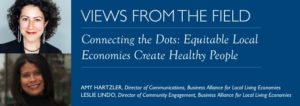
The Business Alliance for Local Living Economies (BALLE) has spent the last 17 years working with thousands of local businesses, investors, and civic leaders who are strengthening local economies and communities across the United States and Canada. These leaders work to support entrepreneurs, drive investment in local businesses, and build equity in their communities.
Several years ago, we began to identify a set of strategies that consistently create local economies that work for all. We began to outline the many roles and sectors involved in establishing and growing Local Economy Ecosystems and, over years, worked with our community to distill these ideas into a Local Economy Framework.

At the same time we were producing the Local Economy Framework, the Presencing Institute at the Massachusetts Institute of Technology (MIT) was working globally with top government officials, nongovernmental organizations, and businesses to create social technologies, build capacity, and generate spaces where leaders can create profound societal renewal. Out of this work, they identified their own set of strategies for transforming our economy.
The strategies identified by BALLE, from a bottom-up business perspective, are nearly identical to those outlined by MIT’s Presencing Institute, from an academic perspective:
- Act local first – Choose local and strengthen your community.
- Prioritize equity – Activate and align for an economy that works for all.
- Regenerate soil and nature – Use business to restore natural environments.
- Accelerate collaboration – Build shared infrastructure to advance cooperation.
- Share ownership – Distribute ownership to create healthier communities.
- Shift capital – Keep more money in your community.
- Cocreate policy – Engage all stakeholders in decisionmaking.
- Cultivate connection – Choose connection in your business and your community.
Prioritizing local business ownership, local production, and collaboration and backing it with supportive community capital and policy—alongside a broader shift from “me” to “we” leadership—weaves greater equity and health into an economy.
Aligning Community Economic Development and Health Care Strategies
Studies over the last few decades have shown that 80 percent of human health is determined by social factors such as income, housing quality, and education, in addition to the availability of quality medical care. What is working to build strong local economies and vibrant communities—around the world—is the same as what is improving human health and well-being in a particular community.
With the support of Kaiser Permanente, BALLE produced The Future of Health is Local field guide to show the leaders of our nation’s health care system how they can be smarter with their business investments to improve health in their communities, and build strong local economies at the same time. The strategies of the Local Economy Framework address the social determinants of health by yielding economic stability, social cohesion, education, access to healthy food and affordable housing, and personal well-being. The field guide includes stories and strategies from three health care institutions that are informing best practices for procurement, employment, governance, investment, and innovation beyond clinical care: Kaiser Permanente, Henry Ford Health System in Detroit, and the Nuka System of Care serving Native Alaskans. The impact of these organizations on their communities is well documented: Kaiser Permanente, for example, has redirected its buying power to support sustainable local agriculture and renewable energy projects, and has purchased more than $1.5 billion in goods from minority- and women-owned businesses.
What Health Philanthropy Can Do
As one example of innovative grantmaking in this area, BALLE Local Economy Foundation Circle member Richmond Memorial Health Foundation awarded $10,000 each to 18 men and women from across the Richmond region to participate in the Equity + Health Fellowships program. Individuals meet regularly to develop recommendations for the foundation. The fellowships program itself represents an important step in ongoing work to build a network of diverse partners with a shared vision. For example, individuals living in Richmond’s economically challenged neighborhoods have a life expectancy that is 20 years shorter than those living in higher wealth neighborhoods. Those inequities did not surface overnight, and it will take a long-term, coordinated effort to address the factors driving those disparities.
Matt Illian, a Trustee for the Richmond Memorial Health Foundation and BALLE Local Economy Foundation Circle member, noted, “There is tremendous uncertainty about equity work that cuts across health, housing, education, and support for new populations. That uncertainty has transformed complacency into urgency—and we have been pleased to discover that our own urgency is being echoed across our region. We were astonished to receive 82 applicants for the 18 positions in the Equity + Health Fellowships program. There is an energy and a willingness to work together in this region that we haven’t seen in the past. Young people are moving into the city and bringing fresh perspectives. We believe we are at a pivotal moment, and we need to take action while there is the commitment and courage to generate positive change.”
Health foundations and corporate giving programs can also urge their grantees and community partners to collaborate with local businesses, investors, and civic leaders who are working to strengthen local economies. There is a collective shift happening in the health care community as hospitals and other institutions discover that what creates equitable local economies makes people healthy too. With health care costs and illness treatment representing $3 trillion in expenditures in the United States—around 18 percent of the country’s GDP—hospitals, health care institutions, and health philanthropy can become a powerful part of rebuilding and revitalizing communities. Shifting even a small percentage of health care’s $780 billion in annual spending and $500 billion in collective investments would have a transformative impact on population health, and create healthier, more equitable local economies, at the same time.

